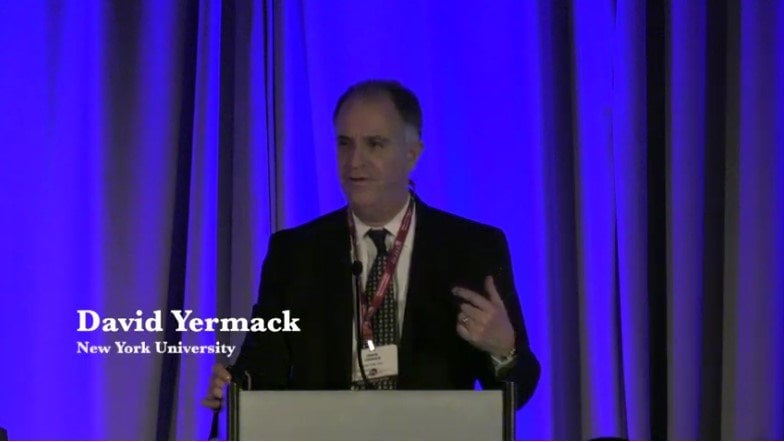The American Finance Association’s session on Blockchain: Myth and Reality.
Session Chair: Luigi Zingales, University of Chicago
Session type: panel
Adair Morse, University of California, Berkeley
Eric Budish, University of Chicago
David Yermack, New York University
Blockchain: Myth And Reality
Q3 hedge fund letters, conference, scoops etc
Transcript
OK thank you very much. I think most of you who are here today know that yesterday January 3rd was the 10th anniversary of the first block. That came across the bitcoin blockchain. So it's an auspicious time to be talking about this despite the wild ride that we've had especially in the last 12 months. I think the attendance we've had three years in a row the same session more or less that the HFA the attendance has closely tracked the price of Bitcoin. We will see where we are next year. But I actually don't even plan to mention bitcoin. Hopefully the last time today because the underlying technology the blockchain that is the record keeping technology behind it is the real innovation and the source of value added here. What I'm going to do here is a highlight show in 10 minutes or less shows six emerging use cases that are very much tied to the legacy financial system and what you're really dealing with here is a new accounting technology. The blockchain is a very different and I think a much better way than double entry bookkeeping of keeping track not only of financial data but just about any data in supply chains authenticating fine art all kinds of other applications but I'm going to focus on where we're already seeing it make its mark in the mainstream financial system.
So I think one area that is really beyond dispute where change is well underway is in the international remittances for many years the SWIFT network which is owned by the major banks the SWIFT network has been pretty much the only way to send money across borders and Ripple has positioned itself as an alternative. So here is some media coverage from theF.T. and The Economist and they tend to frame this as a head to head confrontation. A rebel against swithe but I think this greatly oversimplifies what's really happened which is that many people are now opening blockchains and people were even using the bitcoin blockchain for international money transfers. So I think at the very least the SWIFT network is going to get dragged into the modern world kicking and screaming. But what's likely to happen is that a monopolist marketplaces really in real time being transformed into a very competitive one with many interesting features and we can maybe talk more about this in the panel but given the delays in the fees and the hacking that has gone on for decades in the remittance system I think this is very welcome especially by the customers. A second area that is I think at an earlier stage shows enormous promise is the issuance of securities. So in August the World Bank issued a us a new debt issue over a blockchain. It was actually done in Sydney Australia. So this became known as the Bond Bond which stands for something called the blockchain originated negotiable discount instrument something like this. It's not the first time though there have been a number of high profile cases of corporations essentially using the blockchain to bypass the system of book Building and underwriting and introduce what is a new paradigm of securities underwriting.
I think this has the banks running scared and they are looking for a way to basically be the person running the blockchain and in this case it was an Australian bank Commonwealth bank that got that mandate but I think security issuance is changing and again the customer is probably going to be the huge beneficiary from this in the long run. A third area and I have a paper on this that I'll be presenting at a different session in the afternoon. But the Initial Coin offering burst out of almost nowhere 18 months ago and has grown to the point that more than 21 billion has been raised through ISO's in 2018. A good benchmark is the worldwide issuance of venture capital which is about a 150 billion. So you now have an alternative way for startup businesses to raise money. Now whether they're really raising money or just raising crypto tokens and whether the market didn't fall irretrievably off a cliff six months ago if you look at the monthly data for 2018 I think ISO's have a somewhat uncertain future and you're already seeing a great deal of winnowing of the field and so forth but I think this is a very interesting innovation. It is as far as I can tell the first new way to raise capital that we've seen since the 1980s and there is unquestionably a lot of fraud but also I think a lot of innovation in this area and the regulators have been very challenge about what to do with this. I don't think we've heard by any means the last of CEOs and there's about a hundred academic papers on this and counting. So far I think probably everyone in the room at this point has NYCO paper. Whether we are still writing them in 12 months will be interesting to see.






